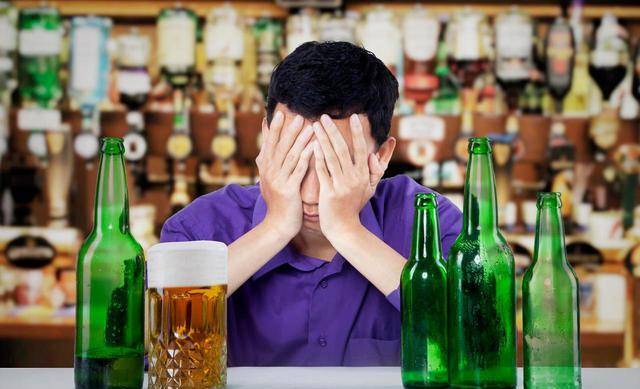Introduction: It is well known that “a little drink cheers you up, while heavy drinking harms your health.” Some people have a special love for alcohol, while others have to drink due to various reasons.
Especially for male friends, sometimes there may be unavoidable traces of alcohol, so they have to steel themselves to drink, only to find out that their health has been affected.
Long-term alcohol consumption, especially heavy drinking, can burden your body’s health and increase the risk of liver diseases, heart problems, among other issues. Therefore, quitting alcohol early is crucial. The metabolism of alcohol generally takes 48 hours, and if male friends can quit alcohol early, they will see many obvious benefits after a week.
What are the harms of long-term drinking?
Induce liver diseases
Long-term drinking can easily paralyze alcohol in the liver, leading to local cell necrosis and preventing its breakdown.
It can also make it difficult to maintain personal body weight, and easily cause liver symptoms such as jaundice and indigestion.
Damage to the heart
Alcohol entering the body can poison myocardial cells, disrupt myocardial contraction, accelerate heart rate, cause arrhythmia, and ultimately harm heart health.
Additionally, the high water content in many alcoholic drinks can burden the heart, potentially leading to heart failure over time.
Damage to the stomach mucosa
Long-term drinking can irritate the gastrointestinal mucosa, leading to symptoms of decreased gastric function.
Especially after drinking strong liquor, it can cause gastric perforation, gastric ulcers, and in severe cases, gastric bleeding.
Damage to the kidneys
Alcohol can easily stimulate the kidneys, accelerate metabolism, increase uric acid levels in the blood, and induce conditions like gout.
Beer, in particular, causes significant kidney damage due to its high purine content. When combined with animal organs, seafood, and red meat, it can exacerbate purine metabolism issues, leading to gout and kidney damage.
After men who have been drinking long-term decide to quit, these areas of the body start to improve after 1 week
Digestive system
Alcohol primarily consists of alcohol, which can stimulate and affect the digestive system, including the intestines, stomach, and liver.
So, long-term drinking can lead to liver and stomach diseases, but if people make the decision to quit drinking, the digestive system generally starts to recover gradually after a week.
After drinking, there will be no acid reflux, heartburn, or nausea, which helps protect the digestive system, liver, and gastrointestinal tract.
Nervous system
People who drink long-term tend to have an overactive central nervous system, leading to neurological disorders.
By actively quitting drinking, the nervous system and sleep patterns gradually return to normal.
Circulatory system
From the perspective of the circulatory system, long-term drinking can harm the cardiovascular system, leading to atherosclerosis and an increased risk of cardiovascular diseases.
After a week’s rest, the circulatory system undergoes changes, heart rate normalizes, and symptoms like palpitations and chest tightness caused by drinking become less frequent.
Immune system
Drinking alcohol can impair the body, as long-term drinking can suppress the immune system, making it harder for the body to resist diseases and increasing vulnerability to bacterial and viral infections.
Quitting alcohol can enhance the immune system, reducing the risk of illness. Quitting alcohol is truly beneficial for overall health.
How to quit drinking effectively? Remember these 3 points
Gradual Progress
Quitting drinking should involve gradually reducing alcohol consumption until the body adapts, and then completely cutting out alcohol.
Learn Self-discipline
Do not find any excuses to drink. There is no situation where drinking is necessary. Stay determined to quit drinking.
Reject Temptation
When pressured to drink, do not waver. Stay resolute in not blindly drinking, as giving in to temptation can undermine efforts to quit drinking.
Learn these 3 tips to reduce alcohol-related harm
Our country has a long-standing drinking culture. Sometimes, at gatherings or banquets, it may be unavoidable to drink. How can we reduce the harm of drinking to our bodies in such situations?
Eat something before drinking
Before drinking, have some protein drinks or eat main dishes, vegetables, and fruits.
This can reduce the stimulation of alcohol on the stomach walls, slow down alcohol absorption efficiency, and help reduce liver damage.
Drink low-alcohol beverages slowly
High alcohol content is more damaging to the liver, so if possible, choose low-alcohol drinks.
Also, sip slowly to prevent a sudden rise in alcohol concentration, which not only increases the risk of intoxication but also organ damage.
Avoid mixing different types of alcohol
When drinking different types of alcohol, our bodies cannot handle the varying alcohol levels, leading to unintentional overconsumption.
Alcohol mixtures also have a synergistic effect, promoting increased absorption and penetration of high-concentration alcohol in the body, causing greater harm.
Further reading: How does alcohol cause blackouts?
After getting drunk and waking up, besides experiencing symptoms like dry mouth and headaches, many people cannot remember what happened before and after drinking—this is called blacking out. How does alcohol cause blackouts?
After heavy drinking, alcohol easily numbs the brain regions responsible for memory, affecting the hippocampus’s ability to function, preventing the brain from recording events.
As a result, memory declines, leading to blackouts after drinking.


